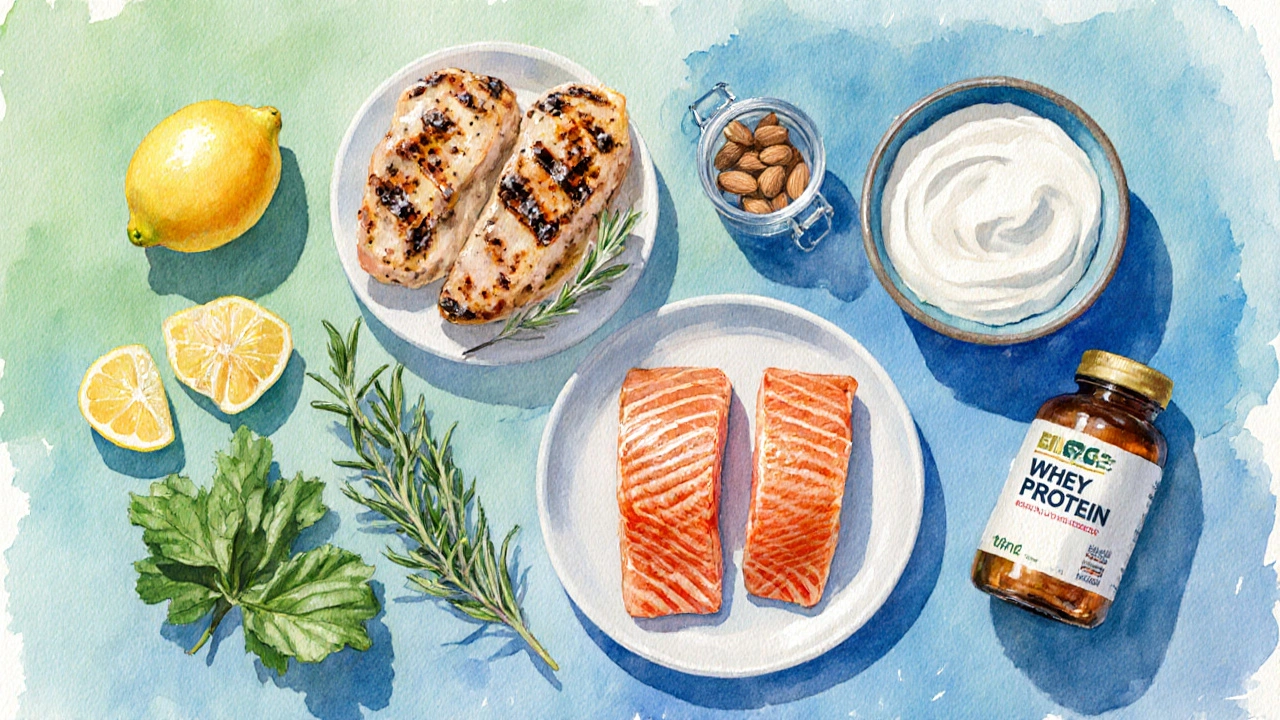Protein Intake Calculator for ALL Patients
This calculator helps determine your recommended daily protein intake based on your body weight. For patients with chromosome-positive lymphoblastic leukemia, maintaining adequate protein levels is essential for tissue repair, immune function, and muscle preservation during treatment.
Your Results
Based on your weight of kg, your recommended daily protein intake is:
- grams per day (minimum requirement)
- grams per day (optimal for recovery)
Why this matters: During chemotherapy, your body requires extra protein to support immune function and tissue repair. Eating protein-rich foods such as lean poultry, fish, eggs, and dairy helps maintain muscle mass and overall strength.
Living with chromosome-positive lymphoblastic leukemia is a daily balancing act between aggressive treatment and keeping your body fueled for recovery. The right food choices can ease chemotherapy side‑effects, protect your immune system, and help maintain strength during intense therapy cycles. Below you’ll find practical, evidence‑based nutrition tips that fit into real‑life schedules, plus a quick reference table and answers to common questions.
Understanding the Disease and Its Nutritional Demands
First, a brief science check. Acute Lymphoblastic Leukemia (ALL) is a fast‑growing cancer of the white blood cells. When the disease carries specific chromosomal abnormalities-like the Philadelphia chromosome-it’s labeled chromosome‑positive. These genetic changes often make the leukemia more aggressive, meaning treatment intensifies and side‑effects can be harsher.
Nutrition matters because chemotherapy attacks both cancer cells and healthy rapidly dividing cells, especially those in the gut lining. This can lead to nausea, loss of appetite, and malabsorption of key nutrients. Your diet, therefore, becomes a tool to replace lost calories, protect gut integrity, and support the immune system while you fight the disease.
Core Nutritional Principles for ALL Patients
- Calorie density matters. Aim for 30-35kcal/kg body weight per day, adjusting upward if you’re losing weight.
- Protein is your building block. Target 1.5-2.0g/kg daily to preserve muscle mass.
- Stay hydrated. At least 2.5L of fluids a day, more if you have fever or vomiting.
- Micronutrient focus. Vitamin D, calcium, and omega‑3 fatty acids have shown benefits for bone health and inflammation control.
- Small, frequent meals. Six to eight mini‑meals reduce nausea and keep blood sugar stable.
These pillars guide every food choice you make, whether you’re sipping broth between chemo sessions or planning a weekend family dinner.
Protein Power: Why It’s Critical and Where to Find It
Protein supports blood cell production, wound healing, and the repair of chemotherapy‑damaged tissues. Good sources include:
- Lean poultry (skinless chicken, turkey) - 20-25g protein per 100g.
- Fish rich in omega‑3s (salmon, sardines) - 22g protein per 100g plus anti‑inflammatory fats.
- Eggs - 6g protein each; the yolk also carries vitamin D.
- Dairy (Greek yogurt, cottage cheese) - 10-12g protein per 100g; also provides calcium.
- Plant options (tofu, lentils, chickpeas) - 8-9g protein per 100g; great for variety.
If you struggle with appetite, blend protein powder into smoothies, soups, or oatmeal. Choose whey or plant‑based isolates that provide 20-25g protein per scoop without excessive sugar.

Micronutrient Must‑Haves
While protein fuels recovery, certain vitamins and minerals act as allies against treatment‑related damage.
- Vitamin D - Supports bone health, which can be compromised by steroids. Aim for 800-1000IU daily, sourced from fortified milk, fatty fish, or a supplement if blood levels are low. Vitamin D deficiency is common in ALL patients under corticosteroid therapy.
- Calcium - Pair with Vitamin D; 1000-1300mg per day from dairy, leafy greens, or fortified alternatives.
- Omega-3 Fatty Acids - Anti‑inflammatory; 1-2g EPA/DHA daily from fish oil capsules or oily fish. Omega-3 Fatty Acids have been linked to reduced mucositis severity.
- Zinc - Aids immune function; 8-11mg per day from meat, nuts, or seeds.
Check blood work regularly; your oncologist can guide supplement dosing to avoid excesses that might interfere with chemotherapy metabolism.
Foods to Embrace and Foods to Avoid
| Helpful Foods | Why It Helps | Problematic Foods | Why It Hurts |
|---|---|---|---|
| Bone broth | Rich in gelatin, easy on the gut | Spicy fried foods | Can trigger nausea and heartburn |
| Steamed vegetables (broccoli, carrots) | High in fiber and antioxidants | Raw cruciferous veg in large amounts | May cause gas and bloating |
| Whole‑grain oatmeal | Provides steady carbs and soluble fiber | Sugary desserts | Spikes blood sugar, worsens fatigue |
| Fresh berries | Vitamin C and polyphenols support immunity | Alcohol | Interferes with drug metabolism, dehydrates |
| Lean turkey slices | Low‑fat protein, easy to chew | Processed deli meats with nitrites | Potential carcinogens, high sodium |
Stick to the right side of the table most of the time. Small indulgences are okay if they don’t aggravate symptoms.
Meal‑Timing Strategies Around Treatment
Chemotherapy cycles often come with predictable windows of nausea, taste changes, and low blood counts. Align your meals with these patterns:
- Pre‑chemo snack (30-60min before). Choose a light, protein‑rich option like a banana with a spoonful of peanut butter. This helps prevent low blood sugar during treatment.
- During chemo. Sip clear broths, herbal teas, or electrolyte drinks every 15-20minutes. Solid foods can sit heavy in an already stressed gut.
- Post‑chemo recovery (2-4h after). Offer a protein‑focused meal-grilled salmon, quinoa, and steamed greens-to replenish nutrients lost during the session.
- Evening soothing. A warm cup of ginger‑lemon tea with honey can calm nausea and aid digestion before bed.
Adjust timings if you’re on oral chemotherapy or targeted agents; the goal remains the same-steady nutrient flow without overwhelming the digestive system.

Supplements: When They’re Worth It
Not every patient needs a pillbox of vitamins. Here’s a quick decision tree:
- If blood tests show Vitamin D < 30ng/mL → supplement 800-1000IU daily.
- If you’re on high‑dose steroids → add calcium 1000mg + Vitamin D.
- Persistent mouth sores → consider a zinc gluconate 30mg once daily.
- Low omega‑3 index (<4%) → fish oil 1-2g EPA/DHA.
Always discuss any new supplement with your oncology team; some herbs can interfere with drug metabolism (e.g., St. John’s Wort).
Practical Tips for the Kitchen and Grocery Store
- Batch‑cook protein. Roast a tray of chicken breasts or bake a large salmon fillet on Sunday; portion into freezer bags for quick reheating.
- Prep smoothies in advance. Blend fruit, Greek yogurt, a scoop of protein powder, and a splash of almond milk; store in portion‑size jars.
- Keep hydration handy. Fill a 1‑liter bottle with infused water (cucumber‑mint) and sip throughout the day.
- Use spices wisely. Ginger, turmeric, and mild herbs add flavor without the heat that can trigger nausea.
- Listen to your taste buds. Chemotherapy can alter taste; experiment with sour citrus or mild sweet sauces to make food appealing.
These habits reduce the mental load of decision‑making when you’re already dealing with appointments and side‑effects.
When to Seek Professional Guidance
If any of the following occur, schedule a dietitian visit:
- Unintended weight loss >5% of body weight in a month.
- Persistent vomiting or diarrhea lasting >3days.
- Blood work shows severe deficiencies (e.g., iron, B12).
- Difficulty swallowing or severe mouth sores.
Certified oncology dietitians can tailor meal plans, recommend enteral nutrition if needed, and monitor your progress with lab tests.
Frequently Asked Questions
Can I eat a regular diet during chemotherapy?
You can, but adjustments help. Focus on higher protein, calorie‑dense foods, and avoid spicy or greasy meals that may worsen nausea. Small, frequent meals are easier on the gut.
Is it safe to take multivitamins?
A basic multivitamin without iron is generally safe, but some vitamins (like high‑dose antioxidants) can interfere with chemo effectiveness. Always check with your oncologist before starting any supplement.
How much protein do I need each day?
Aim for 1.5-2.0g per kilogram of body weight. For a 70kg adult, that’s roughly 105-140g of protein daily, spread across meals and snacks.
What fluids are best if I’m nauseated?
Clear broths, herbal teas (ginger, peppermint), diluted fruit juices, and oral rehydration solutions are gentle and help replace electrolytes.
Should I avoid dairy if I’m lactose intolerant?
Lactose‑free milk, fortified soy or almond milks provide calcium and vitamin D without the discomfort. Choose fortified versions to keep nutrient intake adequate.



Comments
Hey everyone, just wanted to say that focusing on lean protein sources like chicken breast, tofu, or low‑fat dairy can really help keep strength up during chemo. Pairing protein with a bit of healthy fat, like avocado, makes it easier on the stomach. Remember to stay hydrated and listen to your body’s signals – if something feels off, talk to your dietitian. You’ve got this, and we’re all here to support each other.
Obviously the entire "protein calculator" is a ploy by big pharma to keep us buying expensive supplements, right??!! They never want us to know that simple home‑cooked meals are enough-if you look closely, the numbers are fabricated to push proprietary protein powders. The real truth is hidden behind layers of corporate jargon; don’t be fooled by slick UI design.
While the author presents a pragmatic approach to protein intake, let us not overlook the philosophical underpinnings of nourishment. Food, in its essence, is a covenant between our mortal vessels and the celestial drive for survival; thus, deliberately selecting amino‑rich sustenance becomes an act of patriotic devotion to the body’s fortitude. One must therefore calibrate intake with a disciplined, almost militaristic, precision, lest the tides of disease overwhelm the spirit.
It is morally reprehensible to ignore the supreme importance of balanced nutrition during treatment; the sanctity of the human form demands adherence to scientifically validated guidelines. One must abstain from frivolous indulgences and focus solely on evidence‑based protein sources. 🍎✨ Let us elevate our discourse beyond mere speculation.
Don’t forget that adding a spoonful of Greek yogurt to a smoothie can boost protein without feeling heavy, and it also supplies probiotics for gut health 😊.
Absolutely! Chop up some boiled eggs and toss them into a quinoa salad for a quick power‑meal. Stay aggressive, stay strong, and remember that each bite counts toward recovery!
Oh, brilliant, another “expert” tells us to chow down on protein while we’re already battling a disease that turns our bodies inside out. You’d think they’d at least acknowledge the sheer absurdity of trying to calculate grams per kilogram when nausea, taste loss, and mucositis turn every meal into a battlefield. Yet here we are, expected to juggle numbers like some sort of culinary mathematician, while the real enemies-chemo‑induced fatigue and the ever‑looming specter of infection-are ignored. Do we really need a fancy calculator when the simplest truth is that a spoonful of peanut butter can be a lifesaver, and a mis‑aligned macronutrient table doesn’t magically cure anything? Moreover, the “optimal” protein range they spew out is a vague, one‑size‑fits‑all fantasy; each patient’s metabolism is a chaotic, unpredictable beast. And let’s not overlook the financial trap-those high‑protein powders they whisper about are priced like gold, targeting vulnerable families already stretched thin. In the end, it feels like we’re being sold hope in the form of spreadsheets, while the underlying systemic issues remain untouched. So, yes, drink your protein shakes if you must, but don’t let anyone convince you that a formula can replace good old‑fashioned common sense and personalized care.
Sure, because counting grams is totally the easiest part of chemo.
Totally get that! Sometimes a simple "eat when you can" approach works best.
Hey folks! Remember to sprinkle some nuts on your cereal – adds protein, texture, and a little crunch! 😋💪 Keep it upbeat and stay hydrated!
One must consider the transcendent nature of alimentation; the very act of ingesting protein is a symphonic overture to the body's own renaissance. In this grand theatre of recovery, each morsel is a line of poetry, each bite a stanza of hope. Thus, let us not reduce nourishment to mere statistics, but elevate it to an art form worthy of contemplation.
Absolutely love the vibe here! 🌟 Adding a protein bar between meals can keep energy up, especially on tough days. You’ve got this, keep pushing forward! 💥
It’s interesting how personal stories about diet can really resonate-like the time I tried a high‑protein soup and felt a sudden surge of energy, which reminded me of how small changes can make a big difference during treatment.
While the previous comment offers anecdotal evidence, it is essential to adhere to clinically validated guidelines; personal anecdotes should not replace professional advice.
shure thing, i guess sticking 2 the protien plan is a gud step, but rly dont forget to listen 2 ur body, sometimes small snack can help.
In the quiet moments between treatments, one might reflect on the paradox of seeking strength through food, yet feeling the weight of existence pressing down; it is a strange dance of hope and despair.
Indeed, the act of nourishing the body is a profound affirmation of life; each gram of protein is a tiny declaration that we refuse to surrender. 🌱✨ Yet, we must balance this with mindfulness, ensuring we do not become enslaved by numbers. In the grand tapestry of recovery, nutrition is but one thread-still, it glitters brightly. 🌟
Oh, because counting protein is the hardest part of surviving cancer-how original.